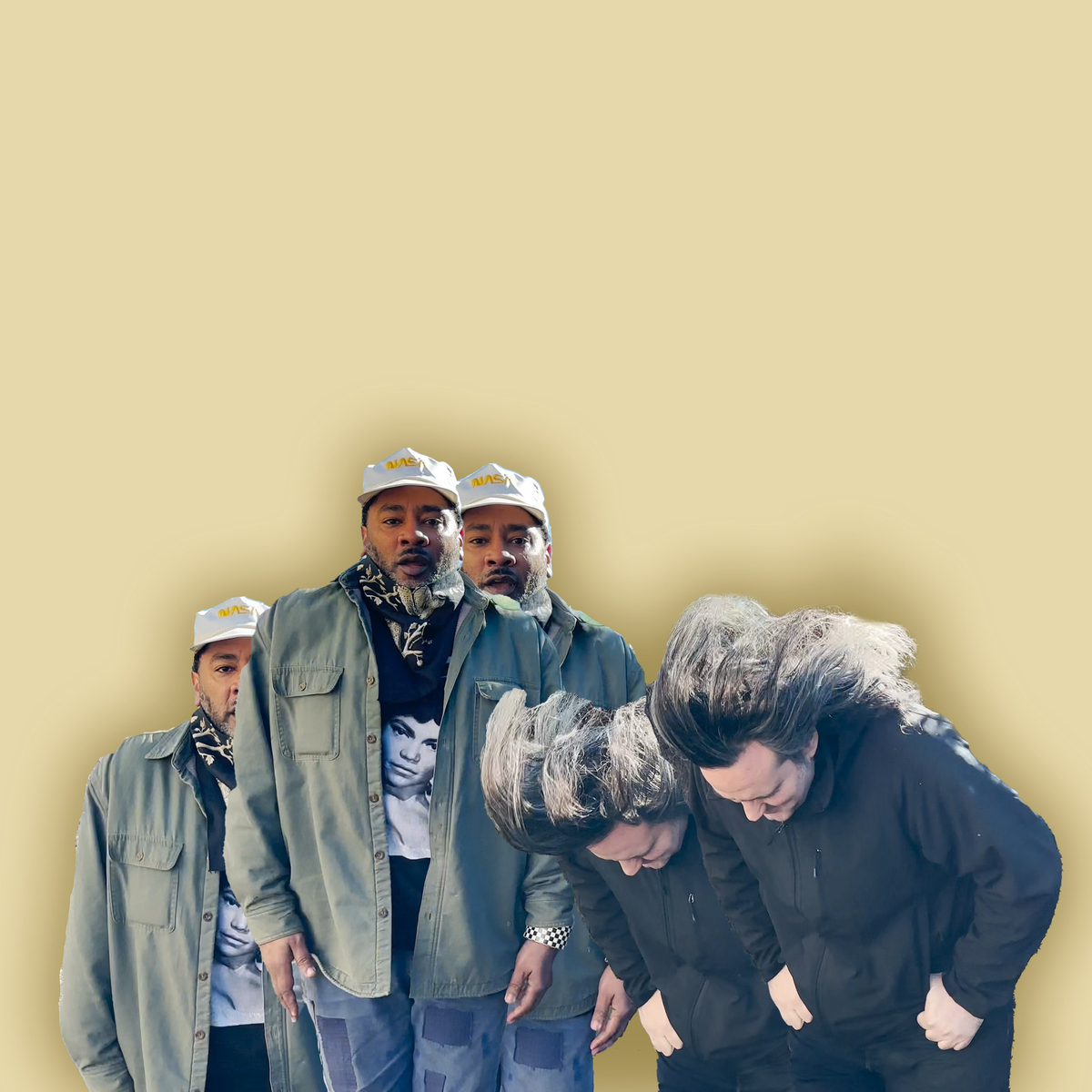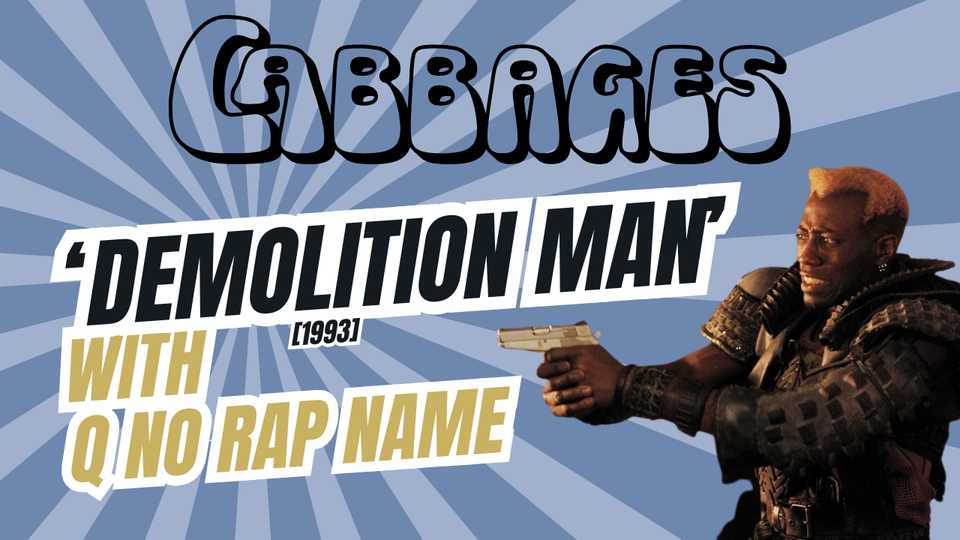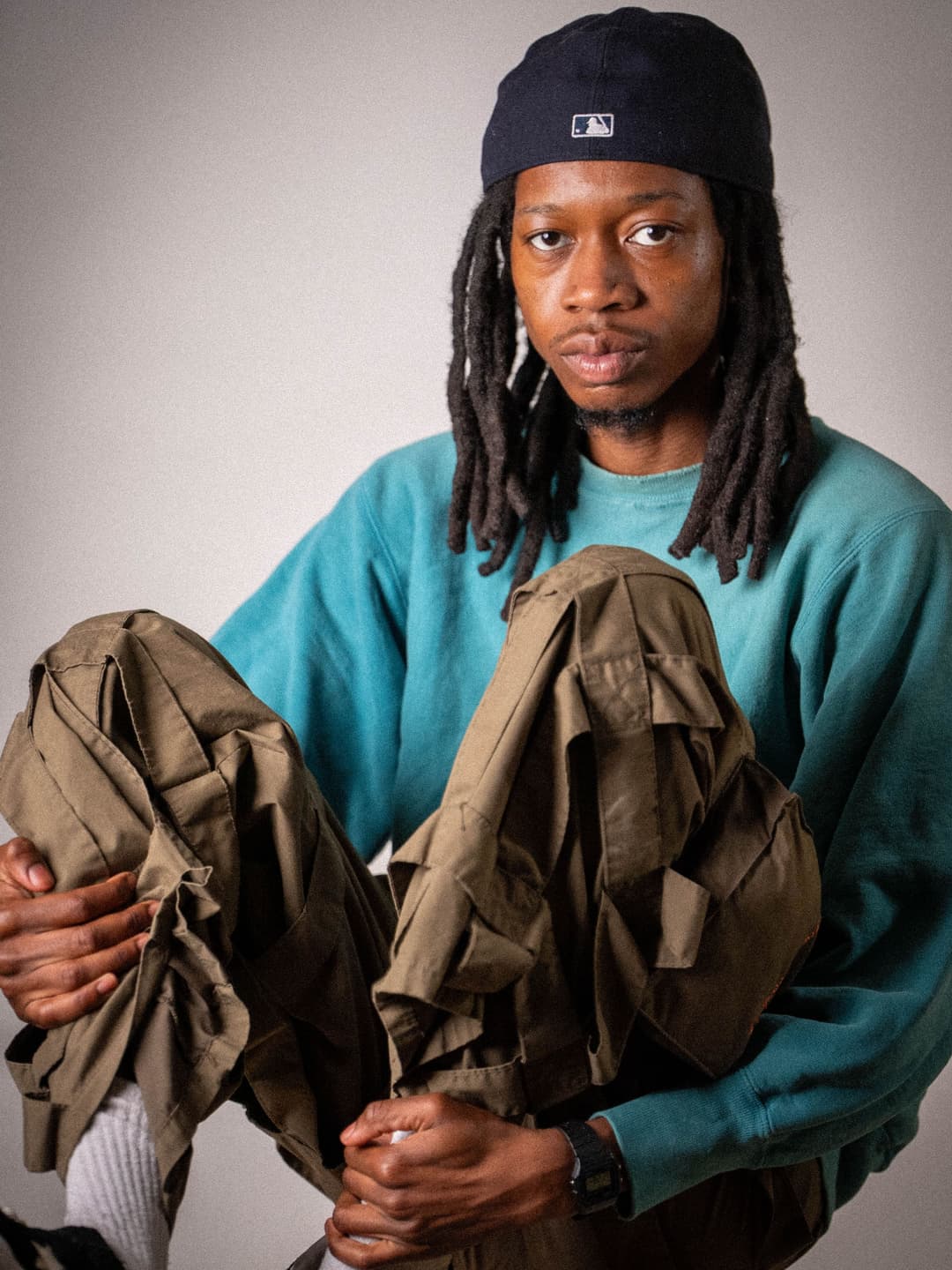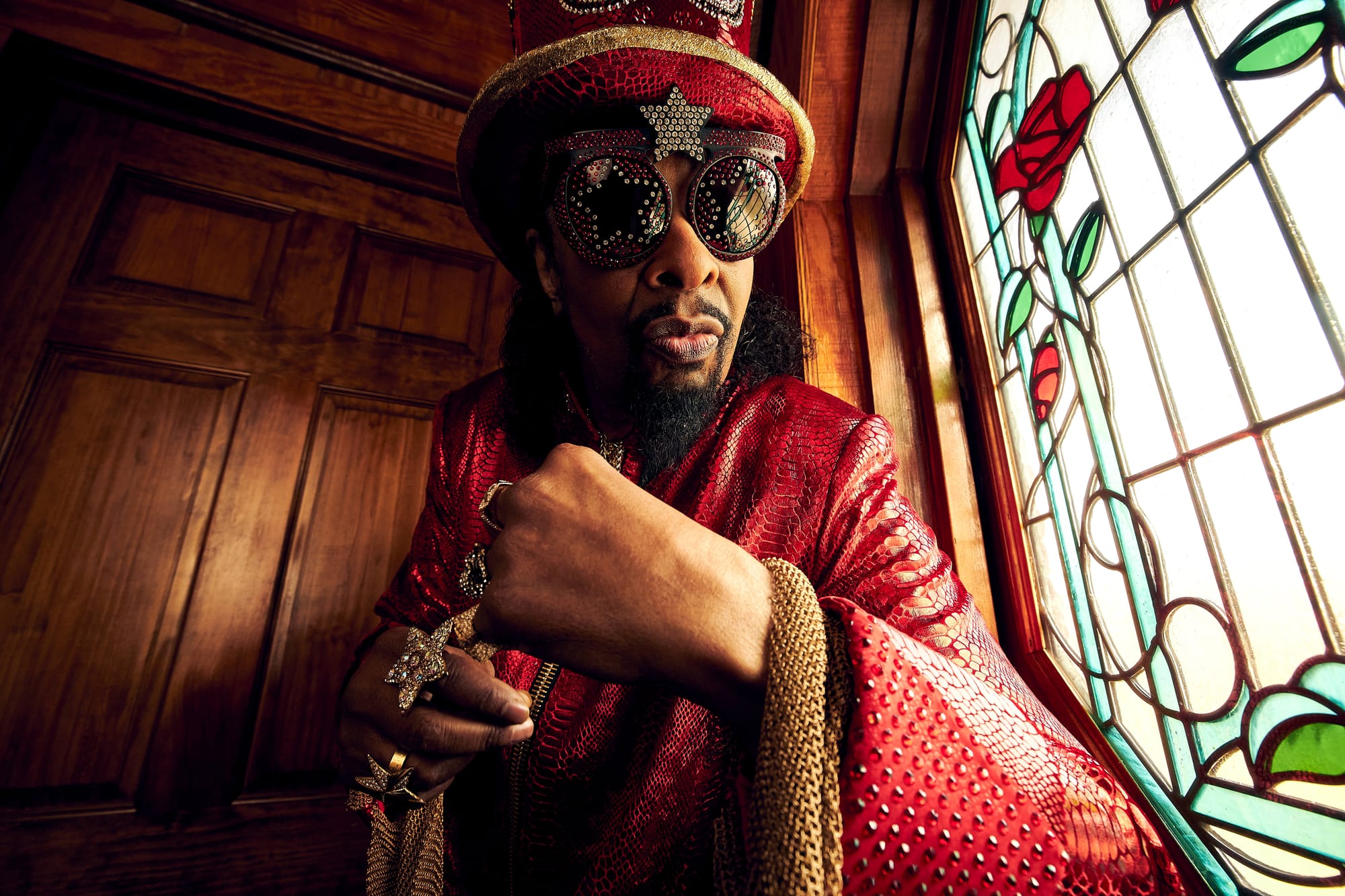They're An American Band: A Wave Generators Interview
Nosaj of New Kingdom and Height Keech discuss their just-released After The End. +reviews of Estee Nack & Pastense

Height Keech walks into Brooklyn cafe Four And Twenty Blackbirds with the air of a heavy metal drummer confidently approaching midlife, his long greying hair signifying road-tested experience. A few minutes later, in comes Nosaj, his Wave Generators cohort, with a neckerchief-accessorized sartorial style so debonair and undeniably fly. There's no argument that, when seated together just moments later, these two dudes look like fucking rockstars.
And that's exactly how they like it.
"We don't want it to be Nosaj and Height–it's a band," Nosaj says. "This is one thing for the sound and ideas." The erstwhile New Kingdom emcee already has his share of rapper-meets-producer projects under his belt of late, including Acid Is Groovy Kill The Pigz with V8 TFD and last year's House Of Disorder with Steel Tipped Dove. When it came to creating Wave Generators' just-released debut album After The End, he insisted on forging something stronger with his new collaborator that extended beyond making demos and into extensive, wide-reaching conversations. "We had to literally have these long drives and have a brotherhood and then go in and with zero gatekeeping, just do shit and not be afraid."
Clearly, this was something Height Keech craved as well. "During the pandemic, there were so many one-off collabs, all internet-based stuff, but I never really got to where it feels like a band," he says. Among those efforts were album pairings with Philly's Darko The Super and Hemlock Ernst (also of Future Islands), profile-raising efforts that showcased his hard rock infused beatmaking style in one capacity or another. On these records as well as numerous individual tracks beyond them, he recognized his role and its inherent limitations. "As a producer, I'm always kind of following what the artist is looking for, giving them a lot of options. I might have a general vibe that I want to go for, but if you're producing for somebody's solo album, it's their album still."
Yet Height is quick to differentiate those experiences from Wave Generators. "This is not just a project, this is what I stand for musically."
Even amid the nostalgic surges of hip-hop's 50th anniversary festivities, Nosaj's 1990s duo New Kingdom didn't exactly make it into the year-long conversation. Ahead of their time, or perhaps entirely outside of time, his rock-informed music with Sebastian Laws never fit neatly into the mainstream scene nor the underground niches. They worked on two unappreciated albums for Gee Street Records with producer Scotty Hard, a studio fixture who mixed and engineered for seminal acts like De La Soul and Gravediggaz, and more recently did so for Mach-Hommy, KA, and Your Old Droog. Among their then-contemporary champions was trip-hop luminary Tricky, who released a collaboration with them as a freewheeling B-side to his 1995 "Pumpkin" single.
Yet while there was no clear clamor last year among the backwards-facing masses for a live reunion from these NYC rap misfits, New Kingdom's relatively short-lived career nonetheless has had a delayed if significant impact. The group's current fans include noteworthy rappers like Kid Acne and ELUCID, the latter of whom called upon Nosaj for Armand Hammer's 2020 album Shrines. "He was just speaking my language so hard," he says of their DM exchange, grateful that he wasn't being asked for a basic 16-bar verse. That momentous collaboration, the hauntingly shambling dub rocker "Leopards," sparked a proper creative resurgence for him, one accelerated by recording his part at Steel Tipped Dove's recording studio.
"When I was like, okay, I'm back in it, 10 toes down in it, I didn't want to just release my own thing," Nosaj says. "I needed to see what's really going on–what's been going on–and who's really on some continuing this post hip-hop idea, departing from the traditional elements of hip-hop and imparting avant-garde ideas."
As it turns out, he didn't need to look very far, as some of his most evident antecedents lay not far beyond his Brooklyn backyard. Beyond the aforementioned Armand Hammer and Steel Tipped Dove, artists like Fatboi Sharif and Height Keech were making music that blurred the boundaries of what most people expected from hip-hop. "People like R.A.P. Ferrera and Serengeti, all these people have opened up this outlet of ears and a touring outlet," he says, examining the broader ecosystem of likeminded performers. "To me, it's so incredible that you don't have to go and ask to be down with some shit that's not even your audience."
And while some of these acts expressed a certain respect or reverence for what New Kingdom had once done, Nosaj realized that he wasn't beholden to his musical past in the way some of his former peers arguably are. "Somebody like me could come 20 years later and find an audience that's not the audience I have before," he says. "Most people, they just go on a retro tour; I want to be just as vital with new music."
Looking back, Wave Generators feels like a logical nexus point on both artists' respective career journeys. Before they'd even met, Keech and Nosaj were first paired on a Darko The Super song called "Cruising (Crew Zen)" off 2021's Cruising with Darko and the Jets. ("He's like 40 Water but different," Nosaj says of Steel Tipped Dove turning him onto Darko's music and making the introduction. "He's from that school and I just love it so much.") Such is the nature of the modern pandemic era, where files traded back and forth make strangers into de facto collaborators, thus raising questions about what collaboration truly means in our digital age.
Thankfully, Height had reached out personally after hearing some tracks on Nosaj's SoundCloud page. "He was doing demos over Medeski, Martin, and Wood and all kinds of crazy sample based stuff," he recalls. "I got in touch and he got back to me in 15 minutes with the nicest response. Even though it's the modern age, I feel like you still think people you grew up listening to are far away."
"I'm a sucker for external gratification," Nosaj tells him with a laugh. "So don't think you're special."
When it finally came time to make good on their early demos together, Wave Generators' ethos was firmly in place. These songs they were creating were expressly intended for live performance, for concert audiences. The way Nosaj remembers it, Height had but one rule: we're going hard. Otherwise, the pair freely explored and tinkered and took risks in that spirit, their respective unconventional natures jibing well. "He'll show up with just a cardboard box full of words written on tissues and cereal boxes," Height says. "Literally a box!"
Nosaj describes their dynamic in terms of Run and DMC, or Robin and Batman, with himself in the former in both scenarios. He was content to let Height take the lead, to provide the foundation, at least to help him get a sense of where he could, in turn, shine. "He runs his mouth in the music so I could feel the energy of what he's saying," Nosaj says. "Sometimes it's really aggressive, but he's not a very aggressive person. So I'm like, okay, I feel a tone for this."
It's this very approach that led to "Reverse The Curse," one of After The End's standout songs, a psychedelic slab that conjures an unapologetically anti-fascist fantasy coupled with Santana album art worship. "Why do we as liberals and progressives have to be so nonviolent?," Nosaj asks aloud while describing the track, mimicking gunshot sounds to accentuate his point. "It was like a snapshot, a small vignette of a movement. And that's what a lot of the instrumentals were giving me. I'd see these small vignettes."
"It just feels like two guys trying to make something that's good," Height says of their music together. "I guess self-awareness is good, but self-consciousness is not good. It feels really easy and natural to start like that every time we work."
Some of their synergies felt even more serendipitous. A relatively recent transplant to NYC, Height confided in the Brooklyn native about how he was feeling about the change and this newfound sense of place. Somewhere in Nosaj's box of notes, there was something that matched the sentiment. "You pulled out an old rhyme where you're talking about being in a new city, but you're talking about being 11 years old," he says to Nosaj.
That led to "I'm Setting Up In A New City," a hooky punk single that exemplifies Wave Generators innate sense of defiance and the stage-ready nature of After The End as a whole. For Height, it also taught him a lesson about letting the creative process lead wherever it may. "A lot of times I feel like part of it was just noticing these happy coincidences when they occur and polishing them from there."


Estee Nack & BoneWeso, "SYSTEMATICALLY WE WERE NEVER FREE" (buy it / stream it)
It's no anomaly that Lynn, Massachusetts boasts some of the best hip-hop artists in the underground today. After all, this is the same locale that brought us such reggaetón greats as Luny Tunes and Bone(s), the latter of whom links with Estee Nack for this veritable full circle moment. Even given the producer's history of working with rap legends like Don Omar, Ñengo Flow, and Voltio, his contributions to "SYSTEMATICALLY WE WERE NEVER FREE" feel like a homecoming of rugged, oft melodic beats that perfectly suit the resourceful Griselda-linked spitter on "DONJULIOREPOSADO" and "PLAYSTATION1." As before, Nackman reaches for reliable topics–elite narco-hustles, hedonistic pursuits, Five Percenter teachings–all to be executed from his unique vantage point. He puts on a street rap clinic with "$1000TIP" and the unsettlingly shimmering "KAOS (RESET)." Awash in flutes and synths, highlight "INTRIGUIN'" boasts unexpected hooks between its firebrand bars, while "STORYMODE" compels listeners into his world.
Pastense, Sidewalk Chalk, Parade Day Rain (buy it / stream it)
The pandemic years certainly impacted the art of introspective emceeing, as the latest effort from Pastense demonstrates. With Uncommon Nasa handling the production side, Sidewalk Chalk, Parade Day Rain gives the raspy Boston-based rapper a surreal and dystopian sonic landscape over which to spit about the visions imprinted upon his mind. The mad metaphors he wields on cuts like "Broken Statues" and "Oil Paint" reflect a gloomy point of view as poetically fantastic as it is apocalyptically bleak. "Journey Back To Reality" contorts ye olde rap motivational trope into an acid-washed, anxiety-inducing truth bomb laced with sci-fi funk. Record label ancillaries Guillotine Crowns throw down for the gratifyingly contentious "Save The Lanternflies" while veteran lyricist Guilty Simpson pops in seamlessly with a gritty feature on "Beautiful."


Three new tracks for you to snack on...
Previous Industries, "Zayre"
Myaap, "MLK"
breakfast tacos, "are you gonna wake up? (feat. Dave Coresh & Andrew Dost)"


![AMILES: The Radio Free Cabbages Interview [Video]](/content/images/size/w960/2025/04/a2769860291_10.jpg)


